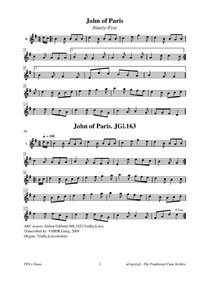Template:Pagina principale/Vetrina

It's will you marry me? No, not I;
I'm ninety-five, I'm ninety five,
And to stay single I'll contrive.
Played by: Orchestra della Svizzera Italiana
Source: Youtube
Image: Léon Riesener - Portrait de François-Adrien Boieldieu

Jean de Paris is the title of a French comic opera with music by François Adrien Boieldieu (1775-1834), 'The French Mozart', first performed in Paris in 1812, and the connection between the march and the opera was recently uncovered in a masterly job of sluthing, recorded the 2/95 Rifles Forum [1], from which the following information is derived.
In 1814 Europe was finally at peace; Napoleon had been exiled to Elba, and the English once again could enjoy French culture.
The opera "Jean de Paris" was exported to London, where an adaptation, with music composed by Charles Horn and Samuel Arnold, was staged at Drury Lane Theatre.
It was not a success, despite prodigious talents of the composers. The New Monthly Magazine (vol. 1, 1814, p. 443), warned its readers:
If the success of this piece is adduced as an instance of public taste, we shall be under the necessity of wishing that our theatres were completely closed, and their companies disbanded to follow a better occupation.
However, a rival adaptation of the French opera was being performed at the same time at the Theatre Royal Covent Garden (Nov., 1814), a two-act comic opera "composed and partly selected from the original...by Isaac Pocock, composed and adapted for the English stage by Henry R. Bishop, Composer and Director of music to the Theatre Royal."
The march was found in Act ii, as a "Pastoral Dance." Pocock's and Bishop's version of "John of Paris" did not fare particularly well, either, with the Works of Sir Henry Bishop reporting that Boieldieu's "pretty Overture is omitted, which a dozen uninteresting numbers by Bishop are inserted...", the exception being the tune that became known in England as "John of Paris."
...more at: John of Paris - full Score(s) and Annotations
X:0 T:John of Paris T:Ninety-Five L:1/8 M:6/8 K:G V:1 clef=treble name="0." [V:1] d/c/|:B2B BAB|d2B BAB|c2e g2e|d2B BAB| c2A AGA|1 B2G G2B|A2B A2B|A2d d2c:| |2 B2G G2F|Eed cBA|B2G G2|| B|d2c Bcd|e2f g2a|b2a gfe|d2c Bcd| e2e ecA|d2d dBG|c2A B2G|FGF D2||
